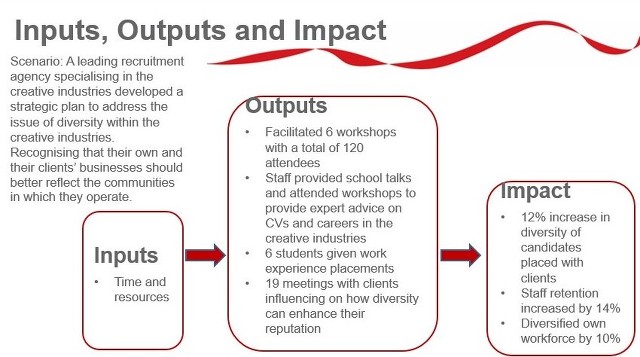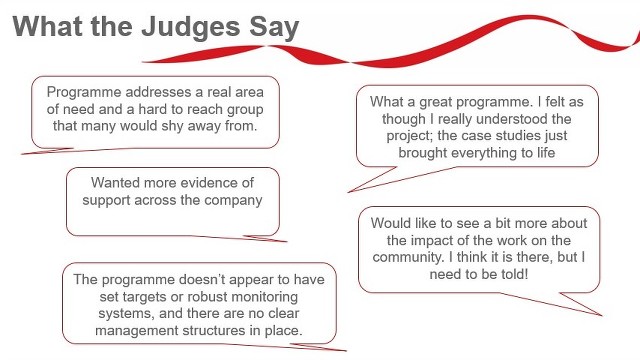Missed our workshop?
Don’t worry, the Lord Mayor’s Dragon Awards team has a whole raft of support available that includes our online resources and our 1:1 sessions to help you Tell Your Story. For now, we have helpfully included a recap of the workshop below!
The workshop provided an overview, top tips for your application, the importance of impact versus output and advice from our judging panels for what they look for in an Award-winning application. So, let’s delve deeper!
Top tips for your application.
- Focus on the impact, not the inputs and outputs (more on that later!).
- Include business, beneficiary and societal benefits.
- Tell a compelling story that doesn’t assume any knowledge.
- Incorporate evidence and endorsements from a range of stakeholders.
- Highlight anything unique or innovative.
- Share what you’ve learnt when things haven’t gone to plan.
- Evidence your future plans.
- Read the guidance notes.
Convince us – create a narrative, highlight innovation, don’t be afraid to talk about challenges.
Remind us of the difference businesses can make – appeal to our hearts – but balance this with real evidence and demonstrate a strategic approach.
Inputs, output and impact – the three stage model
Our independent judges are really focused on impact – on the community organisation, beneficiaries, and wider society where relevant. As well as, on staff and your business.
You will need to provide quantitative data, i.e. number of people who moved into work, % of staff who feel greater pride in your company
And qualitative data, i.e. case studies and testimonials.
With the Heart of the City Award category which is for those businesses new to responsible business, we are primarily interested in seeing how you have put the foundations in place to deliver social impact into the future. We are looking for some evidence of impact, but this carries a lower scoring weight than other categories as we recognise you are at the start of your journey.
Common mistake is to stop at outputs and tell us how many workshops you ran or number of staff volunteering.
But judges want to know what the impact of those workshops or volunteering numbers was.
In short: So what? What is the change?
Here is a scenario to consider:
Using the 3 stage model of Inputs, outputs and impact. We can see that the creative industries recruitment agency identified the need for greater diversity within the creative and media industries. So their initial input was their staff time and use of resources. The output from that time and resources led to hosting workshops, personalised talks at schools and meetings with clients. The impact or the result of this all was that the firm was able to achieve a 12% increase in the diversity of candidates placed with clients, their own workforce diversity increased by 10% and they witnessed a 14% increase in staff retention rates.
So when answering the impact questions, always remember the 3 stage model:
Input – think about what resources went in.
Output – what came out, who was involved, who was reached.
Impact – what difference was made.
Talk about benefits for the three main stakeholder groups:
A common mistake that applicants make is they when talking about the benefits or the impact they often stop at either the local community or their partner but that only tells half the story. We want to know how your initiative has benefited not only your beneficiaries or the wider community but also your business.
The example below of a consulting firm that provided a package of support to social enterprises shows that the benefits can be split as follows:
Impact on people and society (e.g. new jobs created, change in people’s behaviour, skills, wellbeing, life circumstances, increased opportunities, increased employment opportunities).
Impact on SMEs, social enterprises or community organisations (e.g. change in services or reach, change in systems and processes, change in public profile, change in staff, culture or volunteers).
Business impact on employees (e.g. change in staff skills, well-being, behaviours).
Business impact on the organisation (e.g. change in staff loyalty, retention or productivity, recruitment practices or diversity, change in reputation, brand awareness, commercial outcomes, change in operations, culture).
Impact on relevant others (e.g. change in behaviour of other businesses, piloting a new approach for the sector, encouraging other businesses to get involved).
What our independent judges say
And finally, what do your independent judges recommend? Below are a selection of their thoughts based on previous applications and winners:
Don’t assume knowledge – ask someone who doesn’t know the project to tell you where the gaps are. The judges can only assess based on the information presented.
Inspire us – show how you have responded to a real need, leveraged your capabilities to respond to that need, and made an impact.
Talk about the future – we want to know what happens next, how will the impact be sustained – often forgotten.
For community partners – explain your role in managing the partnership, why are you the best partner to a business.
Failure – talk about mistakes made and how you have learnt from it to make your initiative stronger going forward.
Follow the above advice, pay attention to the scoring guides and word limits, and you will be fine! Remember, should you ever need any help, do get in touch, we will be happy to talk! Get in touch via email, twitter or the good old phone!
Good luck!
This write up was compiled by Ikramul Choudhury
Newsletter
Sign up to our newsletter to receive the latest news from our Awards team.


